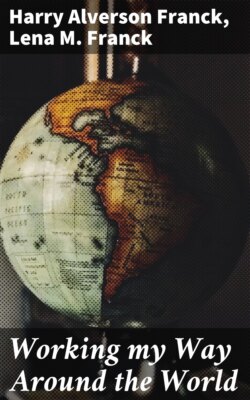Читать книгу Working my Way Around the World - Harry Alverson Franck - Страница 3
На сайте Литреса книга снята с продажи.
CHAPTER I
“CROSSIN’ THE POND WI’ THE BULLOCKS”
ОглавлениеTable of Contents
After spending some sixteen years in schools and colleges, I decided, one spring, to take a year off and make a trip around the world. I had no money for such a journey; but that didn’t matter for I meant to “work my way” from place to place. I spoke French and German, and had some knowledge of Spanish and Italian. I believed that if I had to work among the people of foreign countries I would learn more of them and of their languages than in any other way. So I was not sorry that I had to start my journey with only my camera and one hundred and four dollars for films.
As a beginning I had arranged to cross the Atlantic on a cattle-boat in the employ of a company in Walkerville, Canada. This company ships thousands of cattle to the markets of England every year. When I asked for a job as cattleman, they employed me at once. So it happened that on the eighteenth of June, 1904, I crossed the Detroit River to Canada, and walked two miles to the Walkerville cattle-barns. From the long rows of low brick buildings sounded now and then a deep bellow, or the song or whistle of a stock feeder at his labor. I left my bag at the office and joined the crew in the yard.
The cattlemen had already begun driving the cattle from the stables. It was no easy task. As soon as they were free, the sleek animals began to prance, to race, and to bellow, leading the stockmen a merry chase all around the yard. Little by little, however, the men managed to urge them slowly up the chute into the waiting cars. The setting sun had reddened the western sky, and darkness had fallen in the alleyways between the endless stables, before the last bull was tied and the last car door locked. The engine gave a warning whistle. We who were to care for the stock on the way raced to the office for our bundles, tossed them on top of the freight-cars, and climbed aboard after them.
The train began to move. The stockmen left behind called out farewells to their friends who were “crossin’ the pond wi’ the bullocks”: “So long, Jim.” “Don’t fergit that smokin’ tobacco for me, Bob.” And we were off.
After a short run we came to the main line of the Canadian Pacific. Here our cars were joined to a long train that was being made up. We were to travel in the caboose. As we came into the glare of the tail lights, carrying our bundles and long poles, the trainmen saw us, and began growling: “Huh! more cow-punchers!”
We rode for thirty-six hours. When we reached Montreal at last, we left the stock to the care of the feeders at the railroad pens, and went at once to the “Stockyards Hotel”—a building filled from bar-room to garret with the odor of cattle.
Where were we going, and when? Up to this time I had not even learned on what ship we were to sail. Then I heard some one say “Glasgow,” and soon the news leaked out that we were to sail on the Sardinian two days later.
On the second evening I went on board the Sardinian with the rest of our crew, and wandered around among the empty cattle-pens built on the four decks. Toward midnight loads of baled straw were brought on board, and we began to “bed down” the pens. When this was finished, we threw ourselves down in the empty stalls and fell asleep.
We were awakened before daylight by a rush of excited cattle and the cries of their drivers. The hubbub lasted for three hours. By that time the animals were securely tied in their stalls, the winch had yanked up on deck three bulls that, having been killed in the rush, were to be dumped in the outer bay, and we were off down the St. Lawrence. The crew fell to coiling up the shore lines and joined the cattlemen in a glad chorus:
“We’re homeward bound, boys, for Glasgow town;
Good-by, fare thee well; good-by, fare thee well!”
The passage across was like other cattle-boat trips. There were a few quarrels, a free-for-all fight now and then, among the cattlemen: the work was hard, the food poor, and the sailors’ quarters in the forecastle unfit to live in. But the voyage was no worse than I had expected.
On the tenth day out, we came on deck to see, a few miles off, the sloping coast of Ireland. Patches of growing and ripening grain made the island look like a huge tilted checkerboard. Before night fell we had left Ireland behind, and it was near the mouth of the Clyde River that we fed the cattle for the last time.
A mighty uproar awakened us at dawn. Glasgow longshoremen, shouting at the top of their voices, were driving the cattle, slipping and sliding, down the gangway. We had reached Europe at last! An hour later the cattlemen were scattering along the silent streets of Sunday morning Glasgow.
